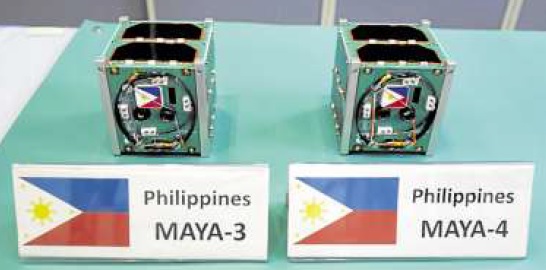
The 1.15-kilogram cube satellites (CubeSats) Maya-3 and Maya-4.
MANILA, Philippines — Two Philippine-made satellites completed their orbit early this month after they were launched late last year, according to the team that designed them.
The 1.15-kilogram cube satellites (CubeSats) Maya-3 and Maya-4 reentered the Earth’s atmosphere on Aug. 4 and Aug. 8, respectively, said a news release by the team affiliated with the Space Technology and Applications Mastery, Innovation and Advancement (STAMINA4Space) program of the University of the Philippines-Diliman.
The team noted that the CubeSats “were identical except for a near-infrared camera mounted on Maya-4, which made the only difference in their missions.”
The bus systems of Maya-3 and Maya-4—or the main body of those CubeSats — were patterned after that of Maya-1, an earlier made satellite in 2018.
Also involved in their development were scholars under the Space Science and Technology Proliferation through University Partnerships (STeP-UP) project funded by the Department of Science and Technology (DOST).
Deployed into orbit
Maya-3 and Maya-4 were launched to the International Space Station on Aug. 29, 2021, aboard the Dragon C208 rocket of the Falcon 9 launcher manufactured by US aerospace company SpaceX.
They were deployed into orbit two months later, on Oct. 6, via the Kibo Laboratory Module of Japan.
“The next day[,] on Oct. 7, beacons from the CubeSats were immediately received and decoded… through the Philippine Universities Ground Archiving and Data Reception (Pugad) station in UP Diliman,” STAMINA4Space said.
The CubeSats transmitted to 10 countries the Automatic Packet Reporting System (APRS) beacons—which are “packets” that carry short strings of broadcast information.
Amateur radio operators from eight countries received and retransmitted those packets through digital repeaters, or single frequency devices.
“With Maya-3 and Maya-4, we proved that we can build our own cube satellites locally. We can locally develop the necessary expertise for our budding space industry,” said Paul Jason Co, STeP-UP project leader.
‘Great challenge’
Judiel Reyes, one of the developers, said it was a “great challenge” to be part of the pioneering batch of a local project for satellite development.
“Expectations were high. We had a vague map of where we were going, but we were tasked to navigate it in a local setting. But it became our greatest achievement. We were able to build the satellites and successfully deployed them into orbit,” he said.
STAMINA4Space said a second batch of STeP-UP project scholars are developing two more CubeSats which they aim to launch next year.
The project also has the support of the country’s space agency, simply named the Philippine Space Agency, which is under the Office of the President.
RELATED STORIES
PH’s Maya-1 CubeSat deployed into Int’l Space Station
PH’s own satellite service to improve maritime surveillance